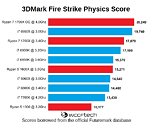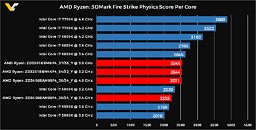Raevenlord
News Editor
- Joined
- Aug 12, 2016
- Messages
- 3,755 (1.22/day)
- Location
- Portugal
| System Name | The Ryzening |
|---|---|
| Processor | AMD Ryzen 9 5900X |
| Motherboard | MSI X570 MAG TOMAHAWK |
| Cooling | Lian Li Galahad 360mm AIO |
| Memory | 32 GB G.Skill Trident Z F4-3733 (4x 8 GB) |
| Video Card(s) | Gigabyte RTX 3070 Ti |
| Storage | Boot: Transcend MTE220S 2TB, Kintson A2000 1TB, Seagate Firewolf Pro 14 TB |
| Display(s) | Acer Nitro VG270UP (1440p 144 Hz IPS) |
| Case | Lian Li O11DX Dynamic White |
| Audio Device(s) | iFi Audio Zen DAC |
| Power Supply | Seasonic Focus+ 750 W |
| Mouse | Cooler Master Masterkeys Lite L |
| Keyboard | Cooler Master Masterkeys Lite L |
| Software | Windows 10 x64 |
A number of sites have been reporting on some leaked (as in, captured from Futuremark's database) scores on AMD's upcoming CPUs. Now, some benchmarks seem to have surfaced regarding not only the company's 8-core, 16-thread monsters, but also towards its sweet-spot 6-core, 12-thread CPUs and its more mundane 4-core offerings.
Taking into account some metrics (which you should, naturally, take with some grains of salt), and comparing Intel's and AMD's Ryzen offerings on 3DMark's Fire Strike Physics scores, we can see that a $389 Ryzen 7 1700X (8 cores, 16 threads) at its base clock of 3.4 GHz manages to surpass Intel's competing (in thread count alone, since it retails for $1089) 6900K running at its base 3.2 GHz frequency - with the Ryzen processor scoring 17,878 points versus the 6900K's 17,100. Doing some fast and hard maths, this would mean that if the R7 1700X was to be clocked at the same speed as the 6900K, it would still be faster, clock for clock (though not by much, admittedly). We don't know whether Turbo was disabled or not on these tests, for either AMD's or Intel's processor, so we have to consider that. However, if Turbo were enabled, that would mean that the R7 1700X's clockspeed would only be 100 MHz higher than the 6900K's (3.8 GHz max, vs 3.7 GHz max on the Intel CPU).

We see the same when comparing AMD's six-core, $259 R5 1600X against Intel's $617 6850K, with the Ryzen sample posting virtually the same score, despite running at a 300 MHz lower base clock (3.3 Ghz against Intel's 3.6 Ghz).

Jumping to a per-core analysis of processor speed in the same test suite, though, also reveals some very interesting metrics. here is a test which clearly doesn't scale all that well with extra cores, actually becoming more inefficient, per core, as the number of those increases. However, we can clearly see how much of an improvement AMD has achieved in per-core performance, with the R7 1700X scoring within spiting distance of its much more expensive i7 6900K competition.
Can we just get some real reviews of these pieces of silicon already?
View at TechPowerUp Main Site
Taking into account some metrics (which you should, naturally, take with some grains of salt), and comparing Intel's and AMD's Ryzen offerings on 3DMark's Fire Strike Physics scores, we can see that a $389 Ryzen 7 1700X (8 cores, 16 threads) at its base clock of 3.4 GHz manages to surpass Intel's competing (in thread count alone, since it retails for $1089) 6900K running at its base 3.2 GHz frequency - with the Ryzen processor scoring 17,878 points versus the 6900K's 17,100. Doing some fast and hard maths, this would mean that if the R7 1700X was to be clocked at the same speed as the 6900K, it would still be faster, clock for clock (though not by much, admittedly). We don't know whether Turbo was disabled or not on these tests, for either AMD's or Intel's processor, so we have to consider that. However, if Turbo were enabled, that would mean that the R7 1700X's clockspeed would only be 100 MHz higher than the 6900K's (3.8 GHz max, vs 3.7 GHz max on the Intel CPU).

We see the same when comparing AMD's six-core, $259 R5 1600X against Intel's $617 6850K, with the Ryzen sample posting virtually the same score, despite running at a 300 MHz lower base clock (3.3 Ghz against Intel's 3.6 Ghz).

Jumping to a per-core analysis of processor speed in the same test suite, though, also reveals some very interesting metrics. here is a test which clearly doesn't scale all that well with extra cores, actually becoming more inefficient, per core, as the number of those increases. However, we can clearly see how much of an improvement AMD has achieved in per-core performance, with the R7 1700X scoring within spiting distance of its much more expensive i7 6900K competition.
Can we just get some real reviews of these pieces of silicon already?
View at TechPowerUp Main Site








